Emerging markets often get touted as one of the best ways to invest to tap into the quick growth of rapidly-expanding economies worldwide.
As a result, many experts recommend including emerging markets as part of a globally-diversified investment portfolio but caution against the risks associated with them.
Such risks include the higher potential for political and economic instability, currency fluctuations, lower accounting and governance standards relative to developed markets, and more.
Picking individual firms that will outperform the relative emerging market stock index and something comparable, like the S&P 500, proves even more complicated when forced to navigate these risks from afar.
Many investors may choose to invest in these assets through emerging markets exchange-traded funds (ETFs). We will cover the best-emerging markets ETFs for investors to consider adding to their portfolios.
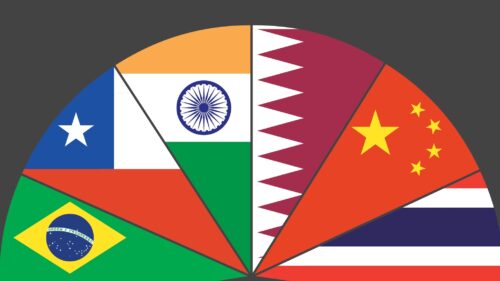
What is an ETF?
ETFs provide exposure to a basket of securities that track an index, meaning they can offer diversification within the asset class. And because ETFs trade on stock exchanges like regular shares, they provide liquidity and can be bought and sold throughout the day.
Investors tend to invest in ETFs because they are a cost-effective and straightforward way to invest in a diversified portfolio with one purchase instead of using stock market analysis and research sites to find individual stocks worth buying for your portfolio.
Now that we know a little more about ETFs let’s look at some of the best emerging markets ETFs for investors.
Best Emerging Market ETFs to Buy
Vanguard FTSE Emerging Markets ETF (ticker: VWO)
The Vanguard FTSE Emerging Markets ETF is one of the largest emerging market ETFs, with over $100 billion in assets under management.
The Vanguard FTSE Emerging Markets ETF from Vanguard Funds invests in stocks of companies located in several major emerging markets worldwide, including China, Brazil, Taiwan, South Korea, and South Africa.
The Vanguard FTSE Emerging Markets ETF aims to closely track the FTSE Emerging Markets All Cap China A Inclusion Index. This broad-based benchmark covers over 4,200 common stocks of large-, mid-, and small-cap stocks located in emerging markets worldwide.
The fund has a low turnover rate of 9% in the most recent year, indicating a low level of the tax impact for investors holding the shares.
Roughly 20% of the fund’s total assets reside in its ten largest holdings and maintain a 0.08% expense ratio.

The iShares Core MSCI Emerging Markets ETF is one of the top emerging market ETFs for investors to get low-cost exposure to a broad basket of stocks in emerging markets.
The $70b+ assets under management fund tracks the MSCI Emerging Markets Investable Market Index, an index composed of large-, mid-and small- market caps stocks or a diversified portfolio of emerging market equities.
The fund offers investors the chance to invest in low-cost, comprehensive emerging market stocks and accomplish the goal of international diversification and long-term growth. The fund’s expense ratio is 0.11%.
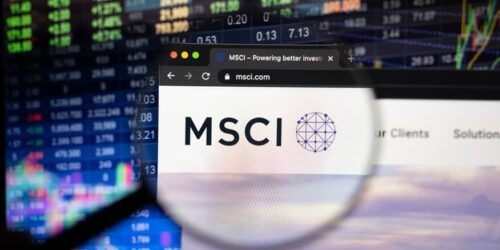
Schwab Emerging Markets Equity ETF (SCHE)
The Schwab Emerging Markets Equity ETF is another fund for investors seeking low-cost exposure to many emerging market stocks.
The fund tracks the FTSE Emerging Index (Net), which consists of almost 1,900 of the most liquid large-cap and mid-cap companies in emerging markets contributing to the global economy.
The fund offers investors the opportunity to invest in a diversified portfolio of stocks in emerging markets with a low expense ratio (0.11%).

The iShares J.P. Morgan USD Emerging Markets Bond ETF is a bond ETF for investors seeking to add emerging markets debt exposure to their portfolios.
The fund invests in U.S.-dollar denominated, investment-grade sovereign (e.g., state-owned enterprises or government ownership bonds) and corporate bonds issued by companies worldwide in emerging markets.
The emerging markets index tracked by the fund is the J.P. Morgan EMBI Global Core broad market index.
The fund has total net assets of $17b under management and a 0.39% expense ratio. As of the most recent data, the fund’s top holdings include bonds from Brazil, Mexico, South Africa, Turkey, and Indonesia.
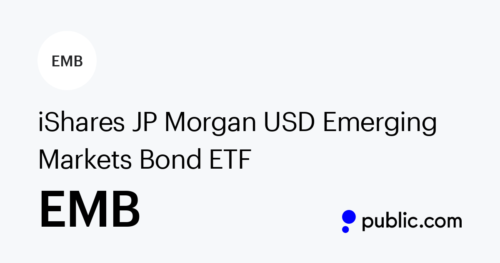
SPDR Portfolio Emerging Markets ETF (SPEM)
The SPDR Portfolio Emerging Markets ETF is a low-cost means for building a diversified portfolio with exposure to a basket of stocks in emerging markets.
The fund tracks the S&P® Emerging BMI Index, a comprehensive, float-weighted, rules-based benchmark that is readily divisible and customizable. Currently, it contains over 2,800 companies and includes:
-
large-cap companies,
-
mid-cap companies, and
-
Small-cap stocks with a float-adjusted market capitalization of at least USD 100 million meeting 6- and 12-month median value traded requirements.
Companies in this fund reside in several emerging markets worldwide, including China, Brazil, Taiwan, and South Africa. The fund has over $6b in assets under management, making it one of the smaller emerging market ETFs.
The fund offers investors the chance to invest in a cost-effective and broad range of stocks in emerging market countries with a low expense ratio (0.11%), primarily weighted toward financials, information technology, and consumer discretionary companies.

The iShares MSCI Emerging Markets ETF is another option for investors seeking more limited exposure to the emerging markets segment, only buying 800+ emerging markets stocks instead of other funds offering more than 1,500 or even 4,000 companies in one fund.
The fund has over $27b of assets under management and trades on the New York Stock Exchange ARCA.
The fund tracks the MSCI Emerging Markets Index, which is compromised of large-cap stocks and mid-cap companies, holding less risk in the emerging markets space than one inclusive of small-cap stocks. Since the fund’s inception in April 2003, the fund has averaged a total shareholder return of over 10% per year.
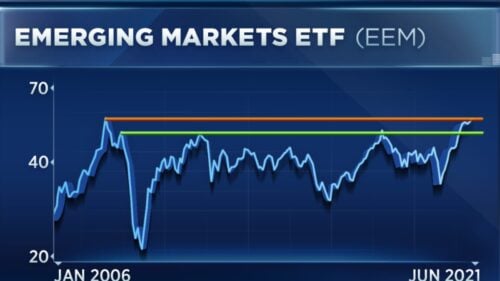
The iShares MSCI Emerging Markets ex China ETF is an emerging markets ETF for investors seeking exposure to stocks in emerging markets worldwide, excluding China.
The fund tracks the MSCI Emerging Markets ex China Index, a market-cap weighted index of large- and mid-capitalization stocks from 24 emerging markets countries.
The fund offers investors a way to gain exposure to stocks in many different emerging market countries while avoiding the potential issues with Chinese companies and the Chinese economy. The net expense ratio for this ETF is 0.25%.
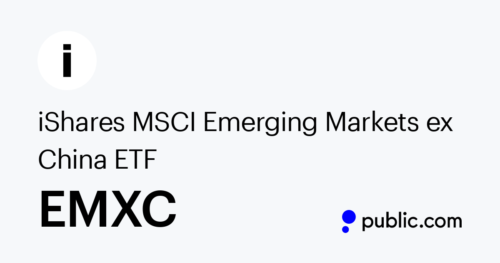
Why Invest in Emerging Markets?
Investing in emerging markets can offer investors several potential benefits, including:
-
Diversification: Emerging market ETFs can help diversify a portfolio as they tend to be less correlated with developed countries’ stocks.
-
Growth potential: Emerging markets tend to have higher growth rates than developed markets and may offer investors the opportunity to participate in that growth.
-
Risk/reward profile: Although investing in emerging market ETFs comes with additional risks, such as political and economic instability, these markets also have the potential for higher returns over the long run.
When deciding whether or not to invest in emerging markets, investors should carefully consider their investment goals and objectives and risk tolerance.
Additionally, it is essential to remember that these investments come with different risks and rewards than investing in developed markets.
The above information should not be construed as investment advice, and you should only invest money you can afford to lose.
Emerging Markets vs. Developed Markets
Here’s a look at some key differences between investing in emerging markets vs. developed markets:
-
Emerging markets are generally defined as countries with lower per capita incomes and higher rates of economic growth than developed markets.
-
Investing in emerging markets comes with additional risks, such as political instability and currency fluctuations.
-
However, these markets also offer the potential for higher returns.
-
When investing in emerging markets, it is essential to remember that these investments come with different risks and rewards than those in developed markets, such as currency and geopolitical risks.
Emerging markets can offer investors the opportunity to diversify their portfolios and participate in the growth of these fast-growing economies.
However, it is essential to remember that these investments come with additional risks.
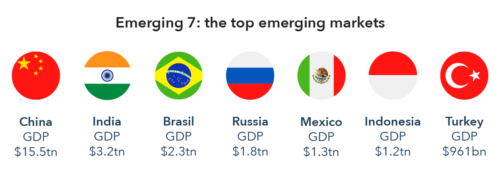
Where to Buy the Best Emerging Market ETFs
Emerging markets ETFs can be purchased through a variety of online brokerages.
Self-Directed Brokerages (for buying Emerging Market Stocks and ETFs)
Some of the most popular online, self-directed brokerages that offer these ETFs include:
-
Fidelity
-
Charles Schwab
-
TD Ameritrade
-
E*TRADE
-
Interactive Brokers
Before investing in an ETF, it is vital to research the fund carefully and its holdings to ensure that it aligns with your investment goals and objectives.
Consider brokerages that avoid trading commissions or other fees for placing trades or holding these funds in your investment portfolio.
Robo-Advisors
You might also consider using a robo-advisor to purchase these funds as part of a globally-diversified portfolio.
Some of the best robo-advisors that offer emerging markets ETFs include:
-
Betterment
-
Wealthfront
-
Ellevest
-
M1 Finance
-
SoFi Invest
These investment tools allow you to invest in a basket of ETFs or stocks, including emerging markets ETFs, for a low monthly fee.
No matter your preference, self-directed or robo-advisor, you’ll find plenty of options to invest in emerging market ETFs. Several of these services also double as valuable stock portfolio tracking apps.
Best Emerging Market ETFs: Final Thoughts
Emerging markets offer investors the chance to achieve long-term growth by investing in a basket of stocks of companies located in some of the fastest-growing economies.
While there are risks associated with investing in emerging markets, ETFs provide a way to diversify your portfolio and mitigate some of those risks.
When choosing an emerging markets ETF, consider your investment goals and risk tolerance.
For example, if you’re looking for growth potential, you may consider an ETF that tracks the MSCI Emerging Markets Index or provides exposure to small-cap stocks.
On the other hand, if you’re looking for a more conservative investment, you may consider an ETF that tracks the MSCI Emerging Markets ex China Index.
No matter which ETF you choose, research the fund thoroughly before investing. Pay attention to things like the expense ratio, the holdings, and the performance over time.
Now that you know more about emerging markets ETFs, you may consider adding one (or more) of these funds to your portfolio.

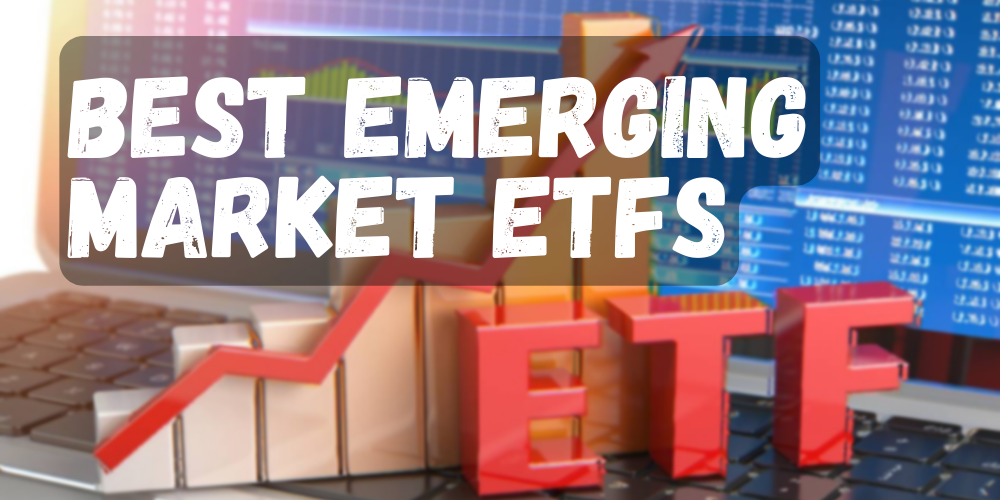
 Tags:
Tags:










